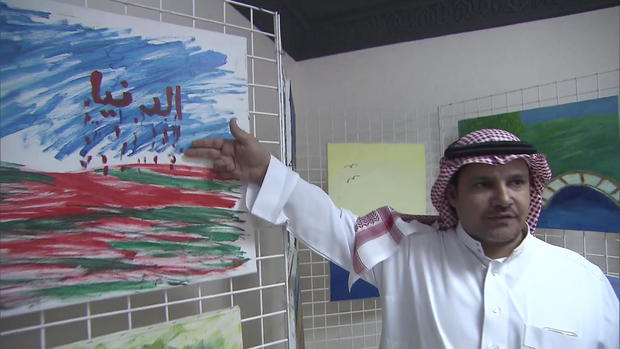Saudi reform center for jihadists offers alternatives to extremists
SAUDI ARABIA -- Islamic terrorist groups get many of their recruits from Saudi Arabia. It's a sore subject for the Saudis, who are part of the U.S.-led coalition conducting air strikes against ISIS.
The Saudis claim they have reformed thousands of terrorists and turned them into law abiding citizens.
Saudi Arabia's terrorist reform center looks more like a hotel than a prison. Its inmates take courses in non-violent Islam and do art as therapy. They've all recently served jail time for terrorist offenses and aren't allowed to appear on camera.
But we were given a tour of their recreation facilities, comfortable living quarters, and special apartments for conjugal visits.
Saudi Arabia is a fertile recruiting ground for al Qaeda and ISIS -- and nearly 3,000 men have been treated here.
But Dr. Hameed Al-Shaygi denies Saudi Arabia bears any responsibility for fueling terrorism. He balks at the notion that the conservative Islam that's practiced in Saudi Arabia is a kind of gateway to violent extremism.
"If that true, then how come we have some Europeans, some British, some Danish, some Dutch went to Syria," he said.
The Saudis claim the three-month program has a success rate of over 80 percent. And Col. Omar Al-Zalal told us financial incentives are a powerful factor.
"Medical, schooling, laundry, food," he said. "All free, yes."
If they pass the exams, the Saudi government gives them an allowance, help finding a job, and even pays for their weddings.
Over lunch we met Abdulrahman Al-Howaiti, a star graduate who's now studying engineering. He told us he joined al Qaeda in Yemen because he was angered by the U.S. invasion of Iraq.
He was asked if he would have at one point in his life have tried to kill an infidel, such as the reporter interviewing him.
"Of course," he laughs.
But after al Qaeda asked him to become a suicide bomber he came home and turned himself in.
"They told me I should wear a suicide vest and blow up a building," he said. "But that wouldn't have achieved anything, and even if it did, I wouldn't have been around to see it."
Saudi Arabian officials admit rehabilitation doesn't always work - but they've had some spectacular failures. When the Saudi police arrested 88 suspected al Qaeda operatives in September, they discovered that 59 of them had been through reform programs and then released.

